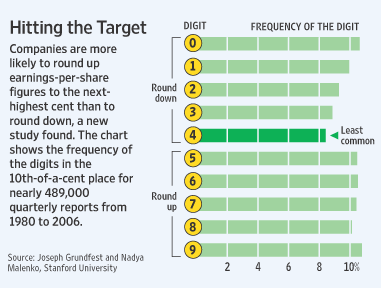The WSJ reports today on a study that confirms what everyone has known for years: That many firms manage their earnings, pulling all manner of shenanigans to beat the street.
The way this form of fraud was detected was rather ingenious: The lower than mathematically expected incidences of the digit “4” in corporate earnings releases. (“X.4” to be precise) This simple statistical insight was due to an analysis of normal random distribution. “When the authors ran the earnings-per-share numbers down to a 10th of a cent, they found that the number “4” appeared less often in the 10ths place than any other digit, and significantly less often than would be expected by chance.”
By finagling the 0.4 to a 0.5, accountants then get to round up to the next higher number. Hence, 12.4 cents is “managed” to 12.5, which then becomes rounded to 13 cents per share.
They dub the effect “quadrophobia” — fear of fours.
Here’s the WSJ:
“A new study provides further evidence suggesting many companies tweak quarterly earnings to meet investor expectations, and the companies that adjust most often are more likely to restate earnings or be charged with accounting violations.
The study, which examined nearly half a million earnings reports over a 27-year period, reached its conclusion by going beyond the standard per-share earnings results that are reported in pennies and analyzing the numbers down to the 10th of a cent.
That deeper look showed that companies tend to nudge their earnings numbers up by a 10th of a cent or two. That lets them round results up to the highest cent. Investors often snap up shares of companies that beat earnings expectations, even by a cent, and, likewise, sell off shares of companies that don’t make their numbers.”
I love the euphemism “meet investor expectations” as opposed to the more colloquial “lie cheat and steal.”
It also points out the need for the SEC to develop a Department of Quantitative Analysis filled with math geeks and computers, doing nothing but sifting through data looking for investor fraud. I’d bet they would get more convictions than the rest of the SEC combined. (If someone in the SEC would call me, I’ll help you set it up).
On an unrelated note: The WSJ yet again takes an academic study that proves Wall Street cheats and liars and runs it on a Saturday. Recall the first Option Repricing article they did that that caused quite a ruckus — a Saturday publication as well. If the historical pattern holds, this article will continue to have legs for the next 2 years, eventually leading to resignations and indictments.
>
Previously:
Backdating Options Widespread (July 17th, 2006)
http://www.ritholtz.com/blog/2006/07/backdating-options-widespread/
Widespread Fraud, Option Backdating, Exec Felonies (August 18th, 2009)
http://www.ritholtz.com/blog/2009/08/widespread-fraud-option-backdating-exec-felonies/
Sources:
Quadrophobia: Strategic Rounding of EPS Data
Joseph A. Grundfest and Nadya Malenko
Stanford University, 2009-10-14
http://www.law.stanford.edu/publications/details/4429/
For Some Firms, a Case of ‘Quadrophobia
SCOTT THURM
WSJ, FEBRUARY 12, 2010
http://online.wsj.com/article/SB10001424052748704479704575061481908470618.html



What's been said:
Discussions found on the web: